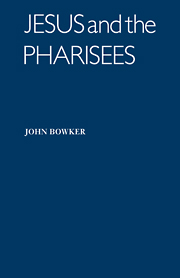Book contents
- Frontmatter
- Contents
- Dedication
- Preface
- Acknowledgements
- Abbreviations
- Note on transliterations
- Introduction
- Additional note: controversies against Sadducees and/or Boethusians
- 1 Josephus
- 2 Mishnah
- 3 Tosefta
- 4 Babylonian Talmud
- 5 Palestinian Talmud
- 6 Other rabbinic works
- 7 Megillath Ta'anith
- 8 Dead Sea Scrolls
- 9 Apocryphal works
- Bibliography
- Indexes
- Frontmatter
- Contents
- Dedication
- Preface
- Acknowledgements
- Abbreviations
- Note on transliterations
- Introduction
- Additional note: controversies against Sadducees and/or Boethusians
- 1 Josephus
- 2 Mishnah
- 3 Tosefta
- 4 Babylonian Talmud
- 5 Palestinian Talmud
- 6 Other rabbinic works
- 7 Megillath Ta'anith
- 8 Dead Sea Scrolls
- 9 Apocryphal works
- Bibliography
- Indexes
Summary
Ber. iii.25
The eighteen blessings (shemoneh ʿesreh berakoth), which the Ḥakamim refer to, correspond to the eighteen mentions of the Divine Name (azkrot) which are in the psalm (beginning): ‘Ascribe to the Lord, O sons of might…’ [Ps. xxix.1]. What pertains to the minim he (the one reciting) includes in what pertains to [i.e., in the blessing pertaining to] the prushim, and what pertains to the gerim he includes in what pertains to (the blessing pertaining to) the zeqenim, and what pertains to David he includes in ‘the builder of Jerusalem.’ If anyone says these on their own (without making the inclusions), he has still fulfilled his obligation.
Cf 5.2. Note the comment of S. Liebermann (Tosefta Kifshuta, p. 54), on this passage, who argued that prushim are those who desert the community in time of trouble, and gave further examples of passages in which this meaning can be discerned.
Dem. ii.2f., 10–14
He who takes on himself four things, they receive as a ḥaber: not to give terumah or tithes to the ʿam haAreẓ, and not to make ready his ritually prepared food with (in the presence of) the ʿam haAreẓ, and to eat ordinary food (ḥulliri) in purity; he who takes on himself to be trustworthy (neʾeman), tithes what he eats and what he sells and what he buys, and does not stay as a guest with an ʿam haAreẓ; so according to R. Meir.
- Type
- Chapter
- Information
- Jesus and the Pharisees , pp. 116 - 124Publisher: Cambridge University PressPrint publication year: 1973



